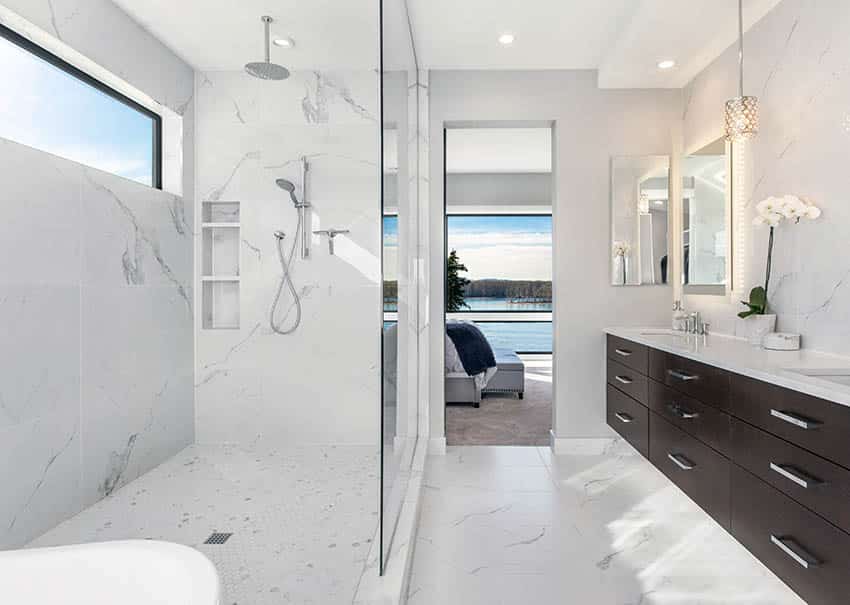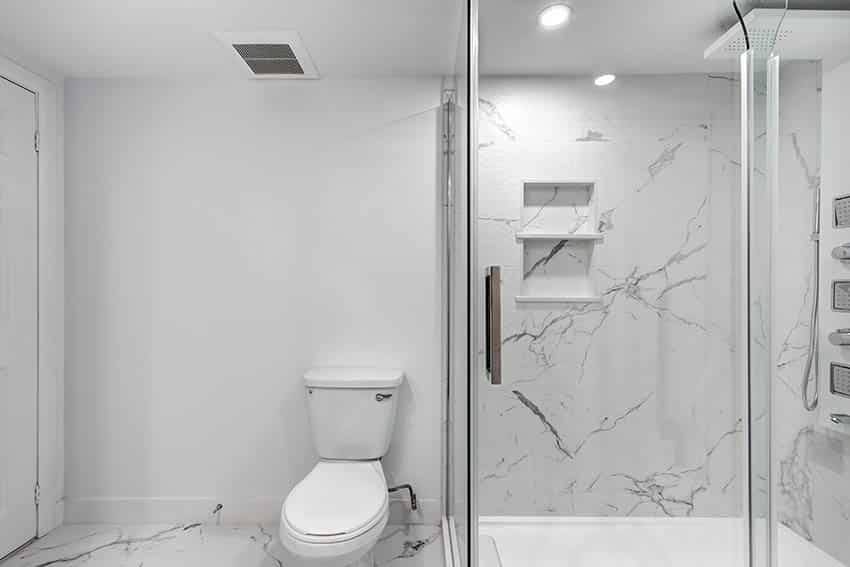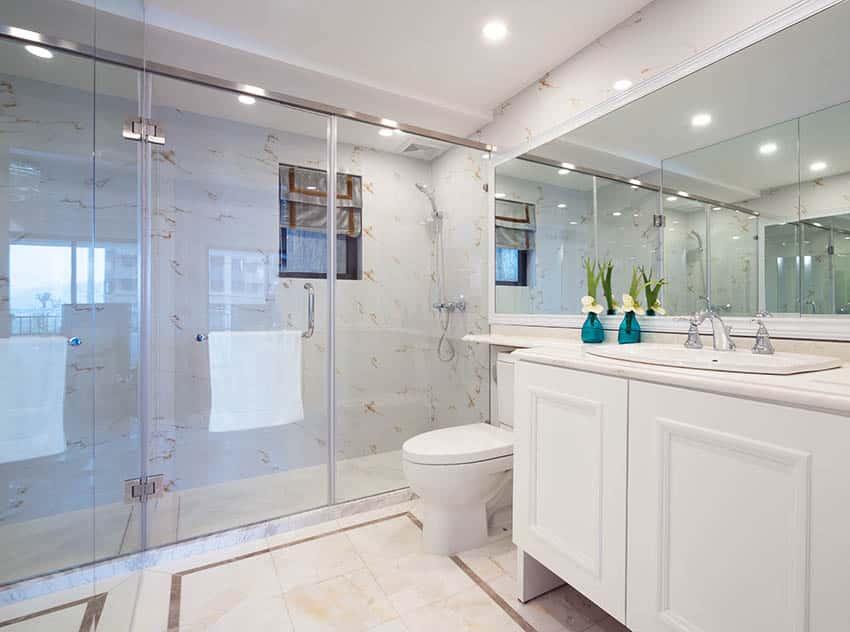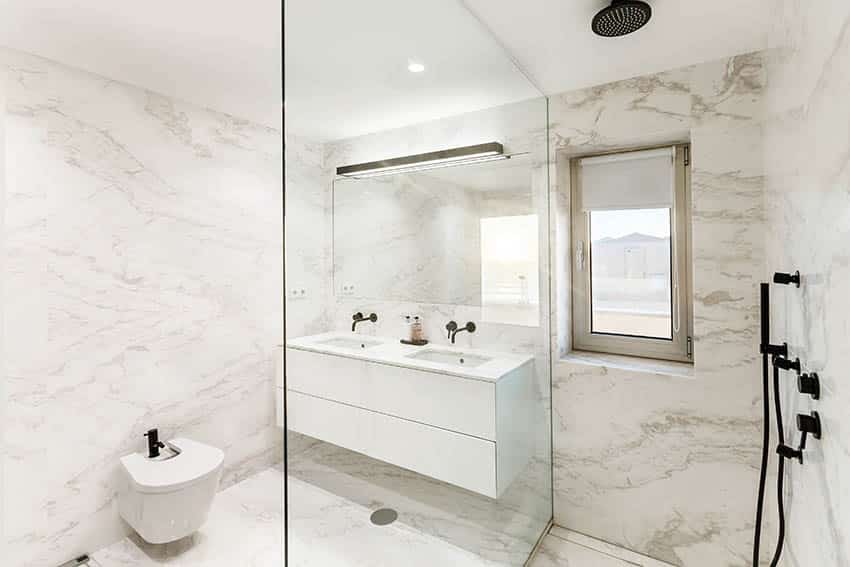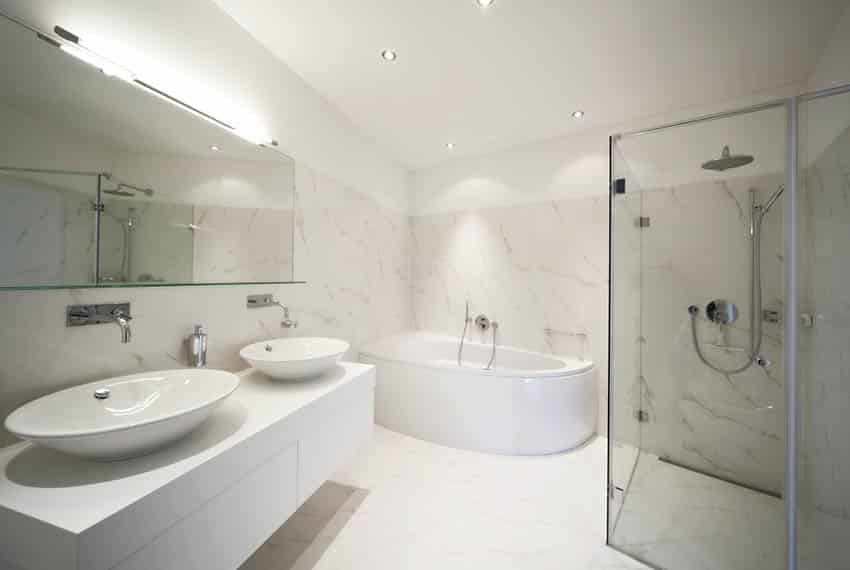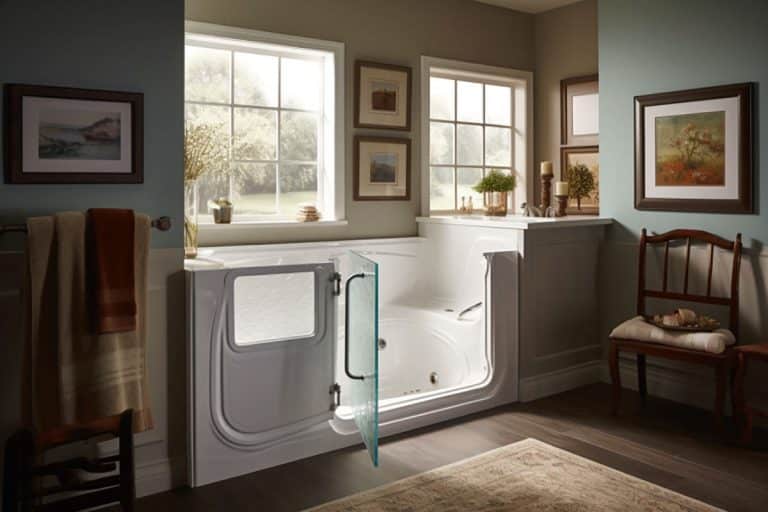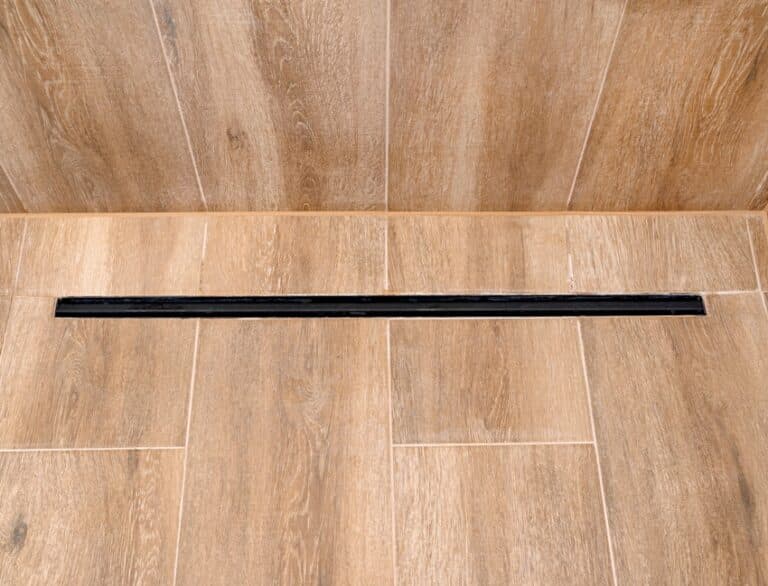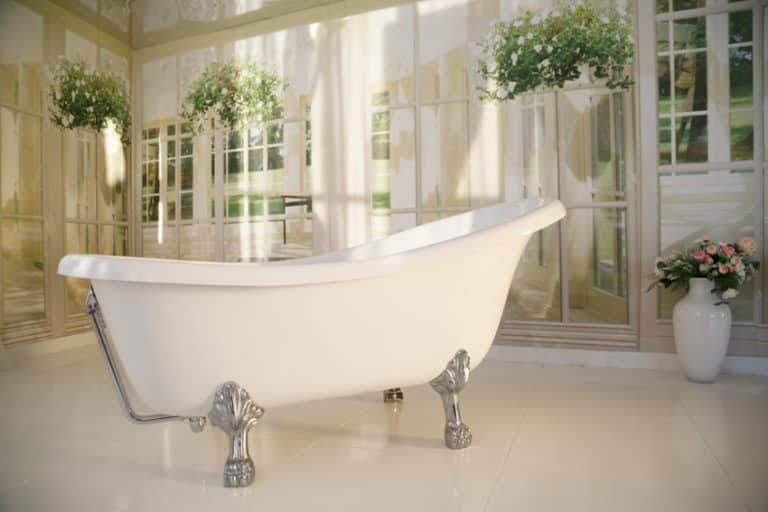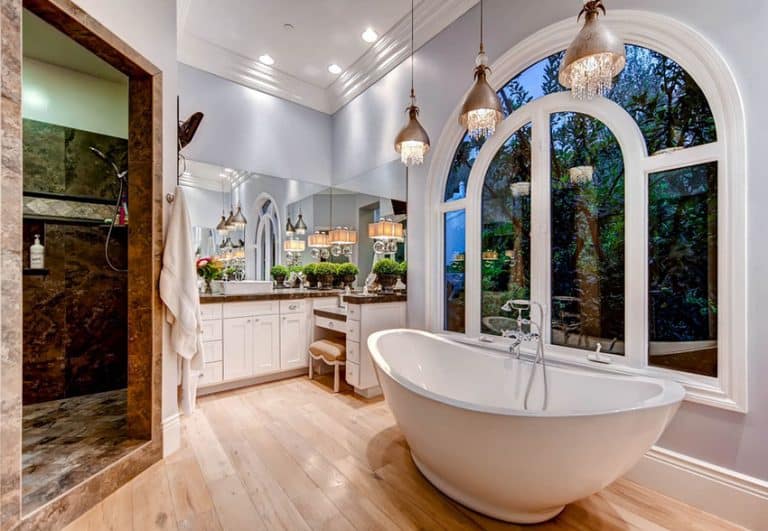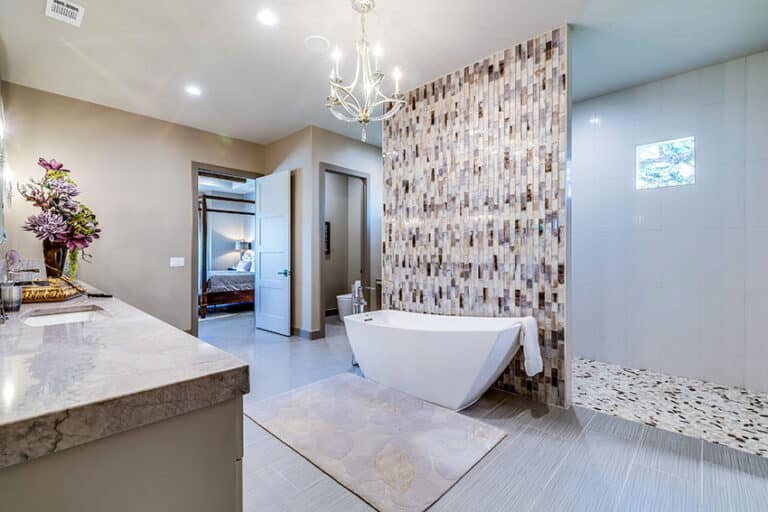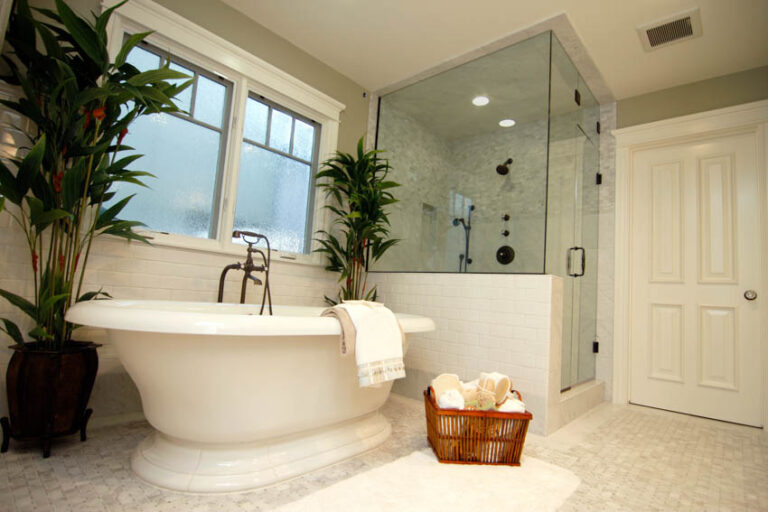Should You Choose Quartz for Shower Walls? Pros and Cons
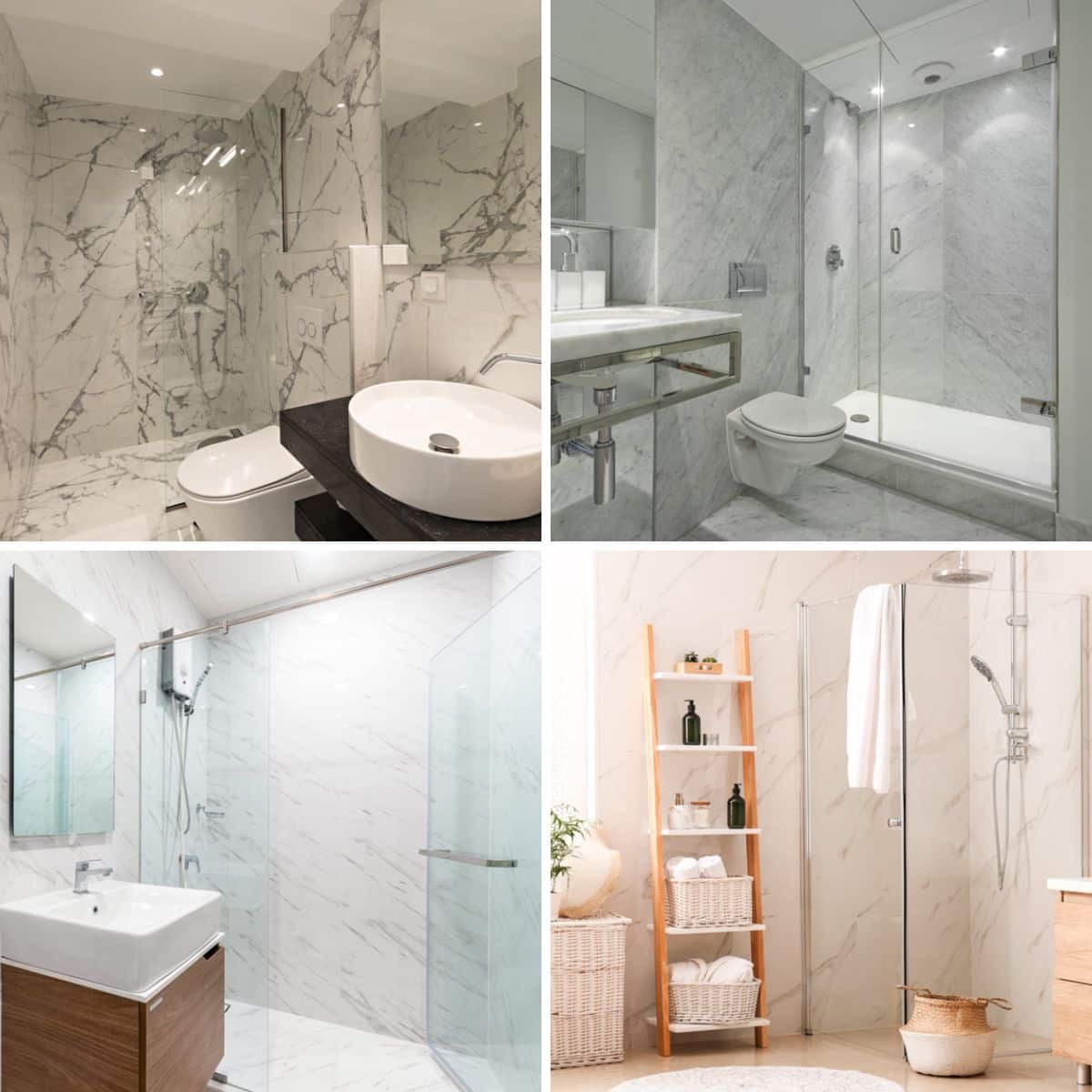
If you’re ready to update or remodel your home, interior design trends now include using traditional materials in non-traditional settings. Quartz, a solid, durable engineered stone, is typically associated with kitchen counters; however, quartz is gaining popularity used in bathrooms for counters, flooring, benches, and shower walls. This material is stunning and offers unlimited design and color options.
A shower is an important functional part of a bathroom and includes an enclosed single stall, a shower and bathtub combination, or a stall in a wet room. Besides being functional, this feature adds to the bathroom style and décor. Using this material for the walls provides durability and an opportunity to create a relaxing focal point in a bathroom.
This material makes a sturdy option and does not have seams such as tiling. It’s stronger than natural stone and is a non-porous, engineered material but requires little maintenance. In this ultimate guide on quartz shower walls pros and cons, you’ll find information to help you decide whether using this material for your bathroom shower walls fits your bathroom design needs.
What are Quartz Panel Shower Walls?
This material is manufactured in sheets that are ¼ and ½ inch thick. The slimmer thickness helps the sheets to be easily installed versus much thicker slabs of quarts as for a countertop. By using quartz, there are no joints to caulk or cause leaks. Panels made from this material are luxurious looking and provide long-life durability preventing repairs and removal.
The choices include many color combinations, patterns, and prints, and include slabs manufactured to mimic the look of various natural stone and other textures. Although quartz is engineered, it’s made of approximately 93% natural quartz and 7% resin and pigment. Combining this ratio of quartz and man-made materials makes products made of this material such as walls very customizable.
Pros of Quartz Walls In A Shower
Durability – It has a non-porous surface preventing germs and bacteria from penetrating the surface, and the finish is water-resistant. It is also is resistant to chipping and breaking, and if properly maintained, this wall surface can last a lifetime.
Low Maintenance – This option is easy to keep clean. Simply wipe the walls with a damp cloth and non-abrasive cleanser. For more shine or to remove any dullness from water stains, use a mixture of vinegar and water sprayed on and wiped dry with a clean, dry cloth. Glass cleaner also works well.
Multiple Design Options – As mentioned, quartz is man-made, and the manufacturing process allows different pigments and patterns to mimic other natural stone such as marble with finely done veining. It can also be manufactured to look like leather, gravel, or any fabric, natural element, or artsy design you need for your bathroom.
Stunning Design – Panels made from this material create a sleek, sophisticated, and minimalist look and feel much like those found in a five-star hotel.
Cons of Quartz Walls For The Shower
This bathroom design option is very sought after and provide a polished contemporary look. They’re easy to maintain and long-lasting. However, it does have a few cons to consider.
Weight – The weight of quartz slabs exceeds traditional materials such as tile and fiberglass. It’s essential to check the flooring and weight limits where the slabs will be installed.
Chemical Cleaners – Cleaners used on this material cannot be made with high acidic content or alkaline ingredients. These chemicals are likely to damage the wall’s surface.
Installation Expense – Laying this material on a floor or using it for bathroom countertops is a generally easy installation process. However, installing vertical slabs made of this material is more complex and requires additional tools and more than one installer. This makes quartz shower walls more expensive to install.
Is Quartz Good For Shower Surfaces?
The walls must be covered by waterproof material that will not crack or leak. Water that gets behind the surface of a wall will cause rot and mold. Quartz makes an excellent material for shower walls due to its non-porous surface, water resistance, low degradation element, and easy maintenance.
It is easy to clean, stain-resistant, very scratch-resistant, and available in a polished, lightly textured honed or matte finish. Its range of available colors makes it an excellent option for matching your style or pairing with other items such as your hardware finishes, towels, area rugs, and other bathroom accessories.
Is Quartz Ok For A Bathroom?
Bathrooms are often designed as private retreats within a master bedroom suite. It is an excellent material for any bathroom offering contemporary design to renovate a traditionally decorated bathroom.
Quartz composite captures the hard durability of stone in a man‐made surfacing material. – Kitchen & Bath Products and Materials, Ellen Cheever, NKBA (National Kitchen and Bath Association)
Slabs made from engineered quartz are great choices for bathroom floors, walls, floors, bath benches, countertops, backsplash above the vanity, and bathtub or Jacuzzi tub surrounds. Being impervious to water, it is a smart choice for bathroom surfaces, and when using these slabs, a visual continuity gives the bathroom a clean-lined finish.
There won’t be tiles and grout to break up the quartz design. It will stand up to everyday wear and tear for the main bathrooms inside as well as bathrooms in a pool house or outdoor shop.If you want to remodel or design your own custom bathroom using this material, you can use a bathroom design software program to help visualize your ideas.
What Is The Best Material To Use For Walls In A Shower?
Fiberglass and Acrylic – Many showers, especially in new homes built with standard materials, are covered with fiberglass or acrylic. Often the walls have a one-piece fiberglass wall molded to fit the shower’s interior.
These fiberglass or acrylic walls are a good choice to contain water and look and perform better than walls with seams. They are inexpensive for walls and as a base, but are prone to scratches and fading. A popular brand is a Corian shower, which comes in many different colors and can mimic the look of natural stone.
Tile – The standard for most walls through the years includes ceramic tile. Although beautiful quartz, ceramic, and porcelain tiles and patterns are very attractive, the chance for leaks and grout failure can mean a lot of upkeep. See more bathroom tile ideas here.
Stone – Stone tiles are beautiful, but natural stone is typically porous and absorbs water and soap residue. These tiles have to be thoroughly cleaned and sealed regularly. Tiles for a granite or a marble shower are more expensive and prone to cracking.
With the many options for wall coverings, this material offers a viable option for providing protection from water damage, allowing beautiful design options, and little to no maintenance. Walls covered with quartz slabs are a beautiful and durable asset for any bathroom.

